Text this colour links to Pages. Text this colour links to Family Trees. Text this colour are links that are disabled for Guests.
Place the mouse over images to see a larger image. Click on paintings to see the painter's Biography Page. Mouse over links for a preview. Move the mouse off the painting or link to close the popup.
St Michal's Church, Inveresk is in Inveresk.
St Michal's Church, Inveresk [Map]. Monument to Thomas Nelson who was drowned by the wreck of the Steam Ship "Mahrata" in the Hooghly River, India when it collided with steam ship "Calcutta" and ran aground on James and Mary Shoal; loss of 49 lives.
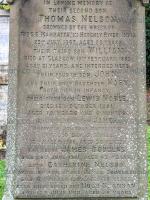
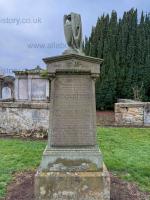
St Michal's Church, Inveresk [Map]. Monument to various members of the Elphinstone family including: William Buller Fullerton Elphinstone 15th Lord Elphinstone, Constance Euphemia Woronzow Murray Lady Elphinstone, William Elphinstone,
Constance Euphemia Woronzow Murray Lady Elphinstone: On 28th December 1838 she was born to Alexander Murray 6th Earl Dunmore and Catherine Herbert Countess Dunmore. On 13th January 1861 John Elphinstone-Fleming 14th Lord Elphinstone died. His second cousin William succeeded 15th Lord Elphinstone. She by marriage Lord Elphinstone. In 1864 William Buller Fullerton Elphinstone 15th Lord Elphinstone and she were married. She the daughter of Alexander Murray 6th Earl Dunmore and Catherine Herbert Countess Dunmore. They were fourth cousin once removed. On 16th March 1922 Constance Euphemia Woronzow Murray Lady Elphinstone died.
William Elphinstone: In September 1740 he was born to Charles Elphinstone 10th Lord Elphinstone. In May 1834 William Elphinstone died.
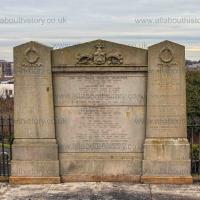
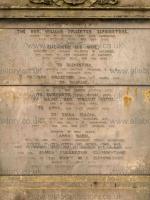
St Michal's Church, Inveresk [Map]. Sacred to the memory of Major-General James Stirling, Lieutenant-Governor of Cork, and for forty-two years an officer in the 42d Royal Highlanders. With a wing of that national corps he annihilated the French Invincibles in Egypt, and took their standard with his own hand. He commanded that regiment through the Peninsular war, and after twenty-seven years of foreign service he retired in 1813 into private life, where, cultivating the virtues which adorn the Christian character, he died, full of years and honours, at his villa of Eskbank, 12th December 1834. His remains, borne hither by his veteran companions in arms, are here interred.
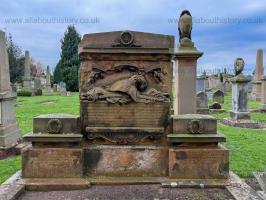
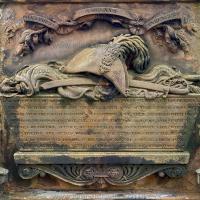
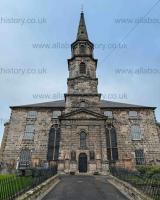
St Michal's Church, Inveresk [Map].
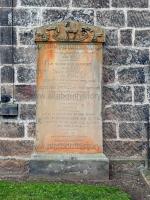
St Michal's Church, Inveresk [Map]. Monument to the three Rae Baronets: David Rae 1st Baronet and his sons David Rae 2nd Baronet and William Rae 3rd Baronet.
David Rae 1st Baronet: In 1724 he was born. In 1804 he died. His son David succeeded 2nd Baronet Rae of Esk Grove. On 27th June 1804 David Rae 1st Baronet was created 1st Baronet Rae of Esk Grove.
David Rae 2nd Baronet: In or before 1768 he was born to David Rae 1st Baronet. In 1815 he died. His brother William succeeded 3rd Baronet Rae of Esk Grove.
William Rae 3rd Baronet: On 14th April 1769 he was born to David Rae 1st Baronet. On 19th October 1842 he died. Baronet Rae of Esk Grove extinct.
Holinshed's Chronicle [1525-1582]. [10th September 1547]. The Scots either for feare of the Englishmens departing, or hope of their spoiling, were out of their campe comming toward them, passed the riuer, gathered in araie, and well néere at this church [St Michal's Church, Inveresk [Map]], yer the Englishmen were halfe waie to it, so quite disappointing the Englishmens purpose. Which at the first séemed verie strange in their eies, as altogither beside their expectation, as they that thought they would never haue forsaken their strength, to méet them in the field. But after it was knowne that they did not onelie thus purpose to doo, but also to haue assailed them in their campe, as they laie if they had not béene stirring the timelier, and hauing caused all their tents to be let flat downe to the ground, yer they came out, bicause none should lie lurking behind them in their campe, and as well the nobles as other, leauing their horsses behind them (except such as were appointed to serue on horssebacke) marched on with their souldiors on foot.
Tudor Tracts Chapter 4. Battle of Pinkie Cleugh.
Saturday the 10th of September [1547]1. This day morning somewhat before eight o'clock, our camp dislodged and our host march straight towards the church of Underesk [Map], as well for intent to have camped nigh the same, as for placing our ordnance, and other considerations afore remembered.
The Scots, I know not whether more for fear of our departing or hope of our spoiling, were out of their camp" coming towards us, passed the river, gathered in array, and well nigh at this Church ere we were half way to it.
They had quite disappointed our purpose" and this, at the first, was so strange in our eyes, that we could not devise what to make of their meaning" and so much the stranger, as it was quite beside our expectation or doubt, that they would ever forsake their strength [strong position], to meet us in field. But we, after, understood that they did not only thus purpose to do" but also to have assailed us in our camp, as we lay, if he had not been stirring the timelier.
And to the intent, at this time, that as well none of their soldiers should lurk behind them in their camps, as also that none of their captains should be able to flee from their enterprise" they had first caused all their tents to be let flat down to the ground ere they came out" and they that had horses (as well nobles as others, a few expected), that were not horsemen, appointed to leave their horses behind them, and march on with their soldiers afoot.
Note 1. This day was long after known in Scotland as "Black Saturday"" and the battle then fought, was the last conflict between the Scotch and the English, as separate nations. E. A.
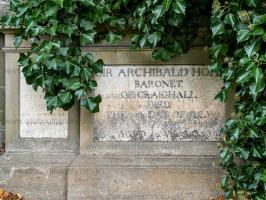
On 10th July 1794 Archibald Hope 9th Baronet (age 59) died. Monument at St Michal's Church, Inveresk [Map].
Archibald Hope 9th Baronet: In 1735 he was born. In 1779 he and Elizabeth Patoun were married.
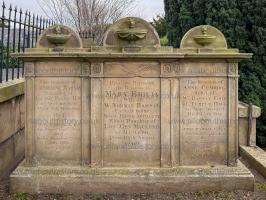
On 10th August 1809 Mary Emilia MacLeod died. Monument at St Michal's Church, Inveresk [Map].
Mary Emilia MacLeod: she was born to Major-General Norman MacLeod 23rd of MacLeod.
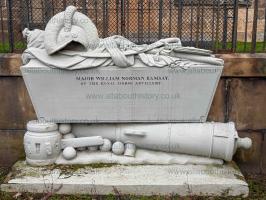
On 18th June 1815 Major Norman William Ramsay (age 33) was killed in action at the Battle of Waterloo. Monument at St Michal's Church, Inveresk [Map].
Major Norman William Ramsay: In 1782 he was born.

On 5th January 1818 Elizabeth Patoun died. Monument at St Michal's Church, Inveresk [Map].
St Michal's Church, Inveresk [Map]. Monument to Alexander Verner McLare M.C. Killed in action 12th April 1918.
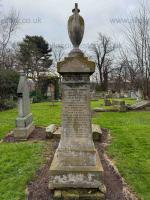
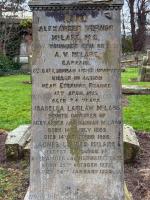
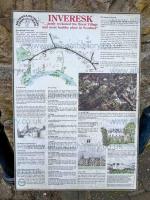
St Michal's Church, Inveresk [Map]. War Memorial.
Tudor Tracts Chapter 4. About a twelve score [240 yards] off from the Frith, over the same river, is there a stone bridge, which they did keep also; well warded with ordnance.
From this hill of Fauxside Bray, my Lord's Grace, my Lord Lieutenant, and the others descended along before their camp; within less than two flight shots into a lane or street of a thirty foot broad, fenced on either side with a wall of turf, an ell in height; which way did lead straight northward, and nigh to a church called Saint Michael's of Underesk [Map] [Inveresk], standing on a mean rising hill somewhat higher than the site of their camp.
Thus this viewed, they took their return directly homeward to our tents. At whom, in the way, the Scots did often shoot: but with all their shots, and of all our company, they killed but one horse in the midst of three, without any hurt of the rider.